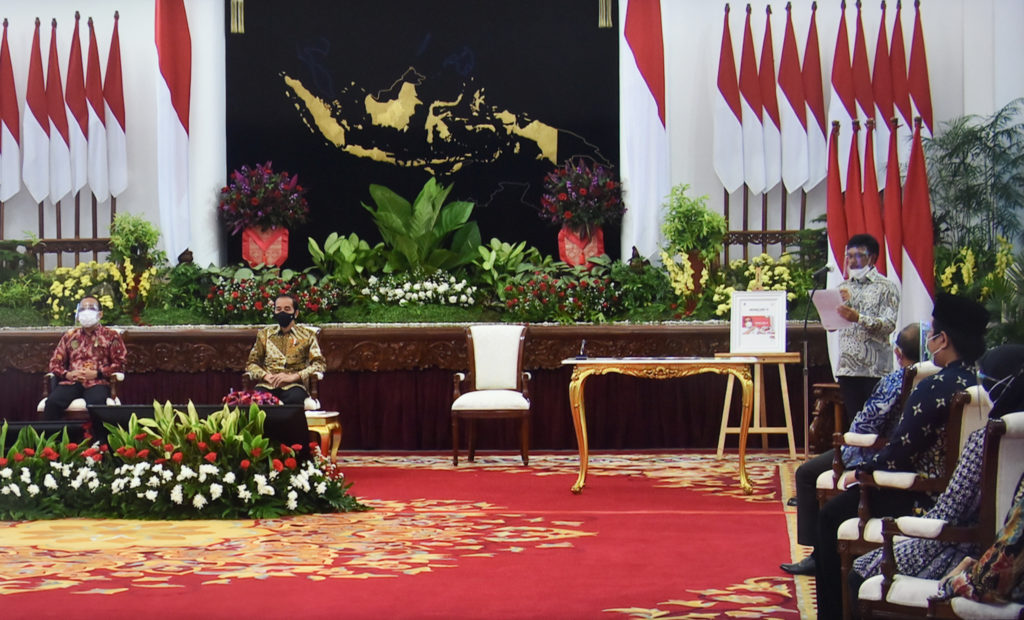Gov’t to Support National Economic Recovery Through Strategic Digital Connectivity Program

Minister of Communications and Informatics Johnny G. Plate presents a report at the Launching of the 2021 Digital Connectivity Program and National Covid-19 Vaccination-themed First Day Cover, at the State Palace, Jakarta, Friday (26/2). (Photo by: Public Relations of Cabinet Secretariat/Jay)
Minister of Communications and Informatics Johnny G. Plate said that the Strategic Digital Connectivity Program serves as an accelerator of transformation and it plays a catalytic role in national economic recovery (PEN).
“These programs are not only a prerequisite for digital transformation but also an accelerator of transformation and a catalyst that supports national economic recovery during the COVID-19 pandemic,” the Minister said in his report during the Launching of the 2021 Digital Connectivity Program and National Covid-19 Vaccination-themed First Day Cover, at the State Palace, Jakarta, Friday (26/2).
According to him, this strategic program includes the development of telecommunications infrastructure and also human resources development through national digital talents.
“Ministry of Communications and Informatics through the Telecommunication and Information Accessibility Agency, which known as BAKTI, together with selected provider partners has signed an umbrella agreement for telecommunications network provision projects in 3T regions (the frontier, outermost, and disadvantaged regions),” he said.
On that occasion, Johnny said that the project covers the construction of cellular base transceiver stations (BTS) in 4,200 villages/sub-district this year, and 3,704 villages/sub-district next year so that all of 3T areas can enjoy 4G coverage.
“The implementation of this project includes five umbrella agreement packages for the 2021-2024 fiscal year consisting of capital expenditure and operational expenditure amounting to Rp28.3 trillion using universal service obligation (USO) funds, some of the funds sourced from the non-tax state revenue (PNBP) allocation in Ministry of Communication and Informatics and the State Budget,” he explained.
The Ministry, he added, is also organizing the Satellite of the Republic of Indonesia (Satria-1) Multifunction Satellite development project under Public-Private Partnership (KPBU) scheme, which has entered the fulfillment phase of project financing. The project document has been signed on Wednesday (24/2).
For the record, the SATRIA-1 satellite will be used to provide internet access for 150 thousand public service points from a total of 501,112 public service points in Indonesia, including 3,700 health facilities, 93,900 schools and Islamic boarding schools (pesantren), 47,900 village and sub-district offices, and 4,500 other public service points.
“With a total satellite transmission capacity of 150 Gbps, each point will get a capacity of 1 Mbps. According to the agreed schedule, the SATRIA-1 Satellite is expected to operate in the third quarter of 2023,” he said.
The Minister also said that along with the development of telecommunications and informatics infrastructure, the Ministry is also implementing a digital talent development program.
“The development of digital human resources or digital talents is also necessary. Therefore, Ministry of Communications and Informatics continues the digital training program, which has been started in 2018, by organizing the Digital Talent Scholarship (DTS) Program at intermediate digital skills level for Indonesian children with high school diplomas or equivalent and undergraduate degrees for 100 thousand participants in 2021,” the Minister said.
The programs offered in the DTS include artificial intelligence internet of things, machine learning, big data analytics, cloud computing, and various derivative technologies.
“This program is implemented in collaboration with global and local technology companies, including 55 university partners, 37 vocational schools, and professional certification bodies in 34 provinces across the country,” the Minister said. (FID/UN) (RIF/MMB)








